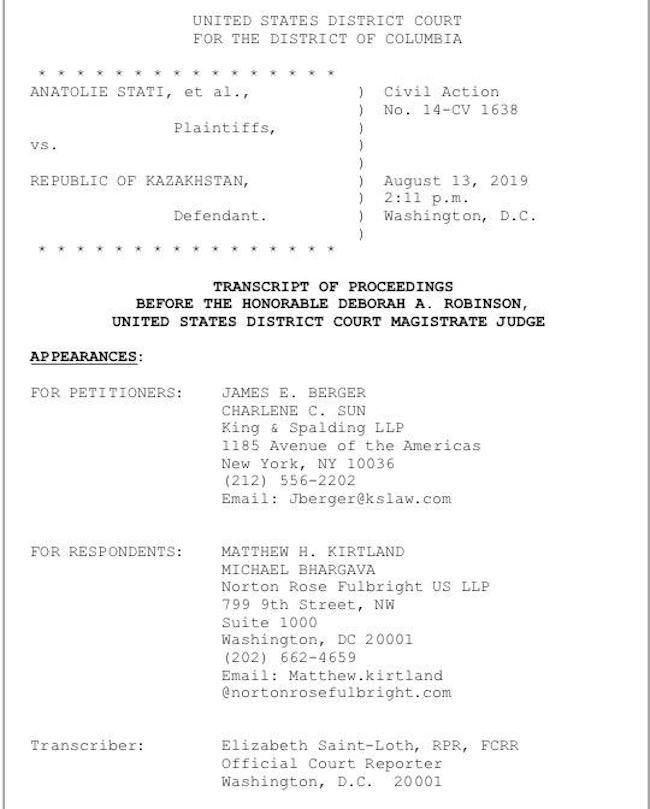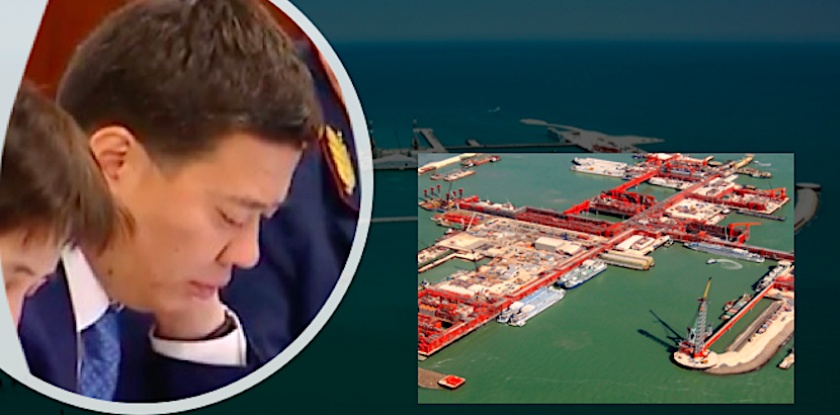The U.S. District Court for the District of Columbia has denied Kazakhstan’s petition to stop the retrieval of the country’s sovereign assets conducted by Moldovan businessman Anatolie Ststi’s legal representatives as part of his litigation with the Kazakh authorities. Moreover, the court has addressed Akorda with a special notice.
The decision of the U.S. District Court for the District of Columbia was made at the hearing held on August 13, 2019. The court has fixed November 8, 2019, as the deadline before which the Kazakh government must present the documents with the information on Kazakhstan’s national assets located in the USA and other countries.
Anatolie Stati, the main hero of this international legal war against the Kazakh authorities, the co-owner and the President of the Ascom Group corporation, believes that, by this ruling, the U.S. court has let the Kazakh authorities know that it is not going to put up with their habit of backsliding on implementing the international courts’ decisions recognized in the U.S. jurisdiction.

The Fight for Kashagan
Siati’s legal battle with the Kazakh authorities in the international courts began after the year 2010 when he was deprived from the Borankol and Tolkyn oil extraction businesses.
In 1999, Stati bought two shell companies with production licenses. Over the course of 10 years, he had invested about a billion dollars in these enterprises and, by the start of 2009, the business became profitable. However, Stati was never to see any dividends. Following the inspections initiated by the state authorities, the investor became a target of criminal investigations and, in July 2010, his assets were nationalized. The Moldovan investor chose not to accept the situation and the legal battle began.
The Energy Charter Treaty (the international rulebook for the energy sector) served as the foundation for Stati’s claims against Kazakhstan. Not only did Kazakhstan sign the Treaty in 1994 but took an active participation in its development at the beginning of the 1990s due to its extreme keenness to attract investments in the country. After 15 years, the time had come to comply with the requirements.
In December 2013, the Swedish International Court ruled that Stati had to be paied 500 $ mln as compensation for the damages. Kazakhstan refused to pay and, a little later, Kazakhstan’s Minister of Justice Marat Beketayev accused Stati of siphoning 167 $ mln off the country.
And so, a new legal began, this time, for Kazakhstan’s assets in the West. Siati tried to freeze them thus hoping to force the government into paying the compensation.
In September 2017, the Moldovan investors were able to secure an arrest of the Samruk-Kazyna National Welfare Fund’s stock of shares in KMG Kashagan B.V., a Dutch company that owns 16,877% of Kazakhstan’s share in the Kashagan oil field in the Northern Caspian. The West sees Kashagan as Kazakhstan’s main asset and the arrest of the governmental share in it would be considered a most powerful blow to the country’s reputation. At that point, it became clear that it was not just the 500 $ mln and the pained investors’ yearn for revanche that were at stake here.
In December 2107, the funds of the National Fund of the Republic of Kazakhstan in the amount of 22 $ bln were frozen in Bank of New York Mellon’s depositary. And the Statis began trying to obtain Kazakhstan’s share in the Kashagan deposit as the compensation payment. In other words, the war had become of the «all-in» nature where the fate of all the Kazakh state reserves was at stake.
Unfortunately, in Kazakhstan, this far-reaching for the country’s future story does not get a lot of coverage (they prefer the genre of censored front-line news, such as «our troops have decided to level off the front line and dropped back, therefore, the attacking enemy has suffered great losses»).
Through Their Teeth
Presently, the lawyers hired by the Kazakh government are fighting in the two fields. And if, in Europe, they are trying to prove that Samruk-Kazyna’s (and Kashagan’s) funds do not belong to the state, then in the U.S., thy are proving a more general thesis — that Kazakhstan does not have any foreign property (not subject to the diplomatic protection) that belongs to the state.
This statement seems too exaggerated to be believable. In order to assess its logic, we have attentively studied the transcript of the August 13th hearing that we have at our disposal. And discovered quite a lot of interesting stuff.
For instance, the lawyers from Norton Rose Fulbright US LLP representing Kazakhstan’s interests tried to stir the pity out of judge Debora Robinson by telling her how Stati’s legal representatives King& Spalding LLP were torturing their clients (Kazakh state officials) with exhausting questionings demanding to name the foreign assets belonging to the state.
The transcript mentions the name of one of the victims, Vice President of the State Property and Privatization Committee of the Ministry of Finance Mr. Ibragimov. (By the looks of it, they are talking about Ibragimov Kalymzhan Ualkhanovich). He had to answer 296 questions.
The lawyers did not give the name of the second official. At the questioning held in London, this person had to answer 361 questions.
Each of the mentioned questionings lasted six hours. And, Kazakhstan’s lawyers believe, all of them aimed to elicit information on the state assets abroad; the assets not subject to the diplomatic protection (for instance, the embassy buildings). The lawyers from Norton Rose were trying to convince the judge that these attempts were futile and extending the deadline would not and could not change anything.
In other words, the Kazakh state authorities (through their attorneys) are officially trying to convince the U.S. court that the country does not have state-owned assets (not only in the U.S. but in other countries as well). A very remarkable fact indeed.
Stati’s attorneys also consider this fact remarkable. In their address to the judge, they said that the Kazakh state was lying when it stated it did not conduct any commercial activities abroad. As an example of these lies, King& Spalding cited the very fact of hiring the U.S. lawyers whose services were being paid for by the country’s government.
Until November
Norton Rose’s representatives tried to present the judge with the entire history of the matter, but Debora Robinson managed to do without it. She supported Stati’s attorneys and demanded the Kazakh authorities to supply all the necessary information naming November 8th as the deadline.
Then, the new hearing is to be held on November 13, 14 or 15. This hearing may become the final one.
Theoretically, Kazakhstan may be forced to sell Kashagan. As fantastical as it may sound, one must keep in mind that, from the very start, the agreement on the development of this field was «a mystery wrapped in a series of scandals». The signing of this agreement resulted in the large-scale criminal investigation in the U.S. that had almost made the country’s President a criminal defendant.
Recall that, in 2010, the investigation resulted in the verdict that was beneficial for the authorities. But, at the same time, the Stati’s case began to develop; the case that had eventually led to Kashagan.







